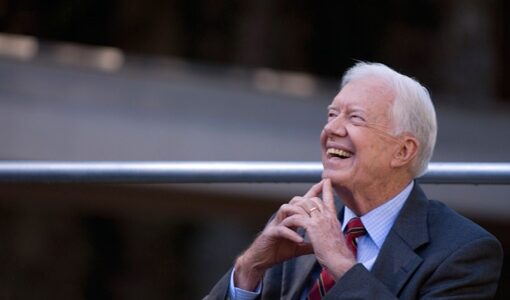I celebrated the election of Jimmy Carter with fellow students, faculty, and administrators of a theological school, munching Southern ham biscuits in the student lounge. Following the presidencies of Nixon and Ford, President Carter and Rosalynn walked hope and joy into the national psyche as they stepped out of their car and made their way to the White House on foot.
Those 48-year-old memories still evoke hope and deep respect for the man. In stark contrast to the incoming administration that thrives on divisiveness, revenge, and the pursuit of wealth and power, Jimmy Carter was all about service.
Recently I read two articles that provided insight into the exceptional life and character of President Jimmy Carter.
The first was Samatha Power’s New York Times opinion piece, “Samatha Power: The Conscience of Jimmy Carter.” In it she noted that Carter often quoted Jesus in Matthew 25:40 saying that whatever we fail to do to the least among us, we fail to do to him.
Human Rights
Inspired by profound faith, President Carter worked tirelessly, during and after his presidency, to promote human rights at home and around the world. He received the Nobel Peace Prize in 2002 “… for his decades of untiring effort to find peaceful solutions to international conflicts, to advance democracy and human rights, and to promote economic and social development.”1
In her opinion piece, Power outlines the central role human rights played in Carter’s foreign policy. He followed the dictates of his conscience, not political polls. He was the first president to publicly support a Palestinian State. He brokered a peace between Egypt’s Anwar Sadat and Israel’s Menachem Begin. His public denunciation of South Africa’s apartheid was the first for a U.S. president.
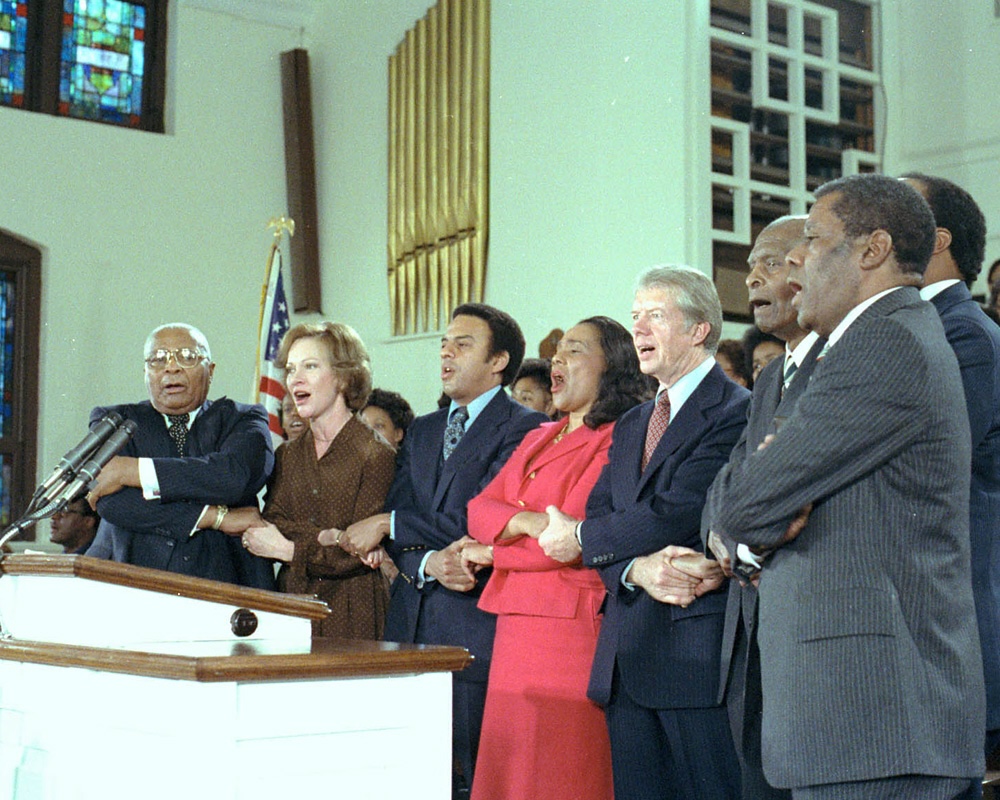
Civil Rights
He grew up in a predominately Black area in rural Georgia and saw first-hand the effects of racism and the courage of those who worked to end it. Martin Luther King, Sr. was a close friend and inspiration. Beginning as a State senator, Carter worked to increase the presence of Black Americans, people of color and women in judicial and government positions. He appointed more African Americans, Hispanics, and women to these positions than all previous presidents combined.2 He also worked to increase fair election practices. As Governor of Georgia, he announced “The time for racial discrimination is over.” He signed the Refugee Act into law in 1980 and welcomed hundreds of thousands of Cuban refugees to our shores.
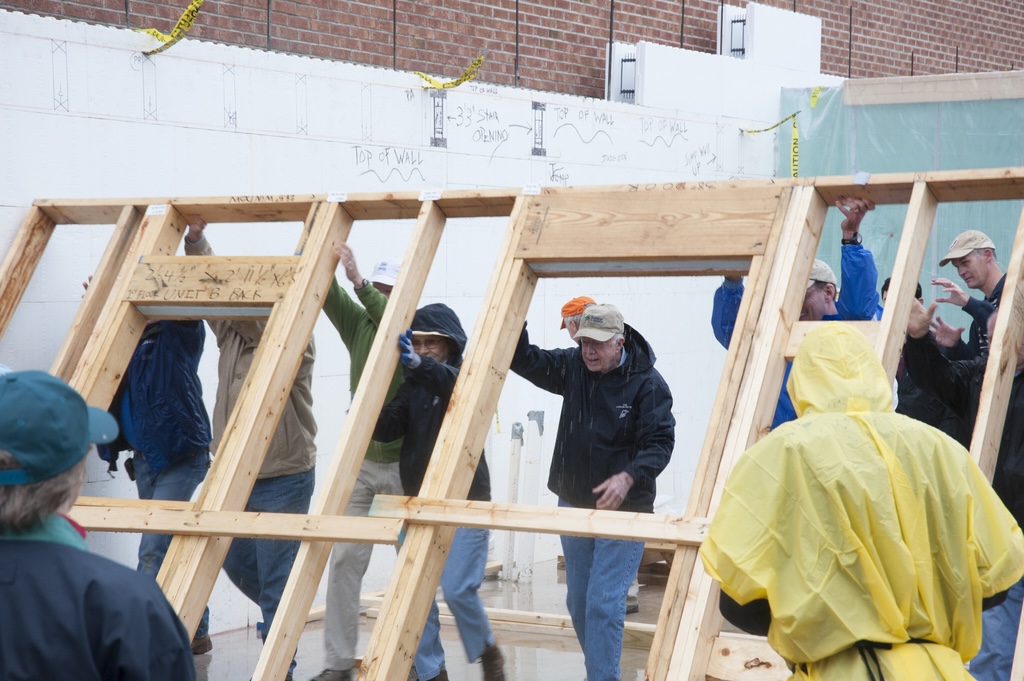
Habitat for Humanity
Carter’s understanding of human rights included the right to food, shelter, health, and education.3 He worked with Habitat for Humanity, along with Rosalynn, building houses, even in his 90s! (I read the book The President Builds a House to my children at dinner one evening, exposing them to a role model and to the truth that helping others is a responsibility we all share, regardless of social position.)
Women’s Rights
He was long a vocal advocate for women’s rights, and he cut ties with the Southern Baptist Convention in 2000, citing the church’s rigid stance on women’s roles both in the home and in church leadership. In 2009 he wrote an essay addressing his action, “Losing My Faith over Equality.” In 2014 he published a book, A Call to Action: Women, Religion, Violence, and Power. (Jimmy Carter wrote over 30 books including poetry and children’s books.)
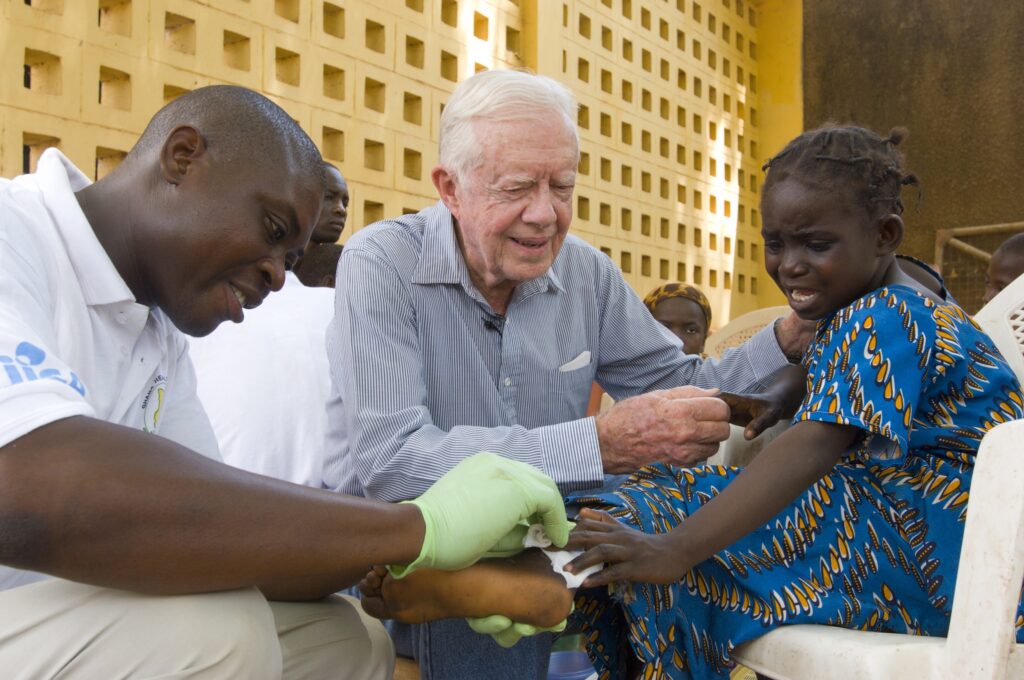
The Carter Center
In 1987, he and Rosalynn founded The Carter Center to promote human rights, democracy, and disease prevention. Along with other organizations (including the United States Agency for International Development where Samantha Power is the administrator) the Carter Center helped reduced cases of the Guinea worm that caused millions of deaths in the 80s and only 13 in 2023. The Carter Center also has all but eliminated the scourge of river blindness.
Foreign policy
Environment
According to Power, Carter “… was the first American president to elevate environmental conservation to a global concern.”4 Carter recognized the human right to clean air and water and the need to protect the environment. He installed solar panels on the West Wing of the White House, providing power to heat the water. (They were removed by President Ronald Regan.) He created 39 new park sites including 13 in Alaska, and in 1980 he signed the Alaska National Interest Lands Conservation Act that provided protection for over 100 million additional acres in Alaska.5
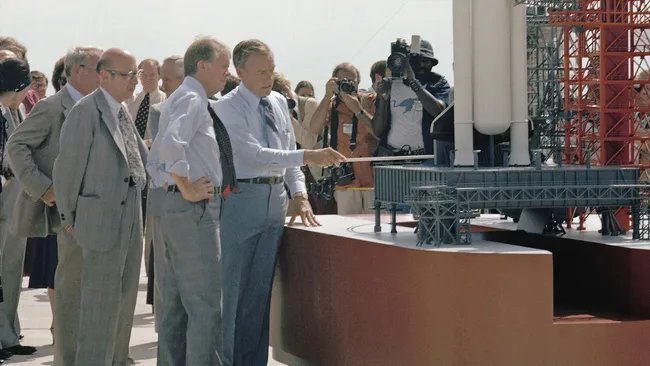
NASA
An engineer as well as a peanut farmer, Carter approved money for the floundering NASA shuttle program. Skeptical, but not wanting to waste money already spent on the program that was years behind schedule and well over budget, he approved millions of dollars and saved the project. His decision was not popular, but in the long run it enabled the creation of the International Space Station (ISS), which today remains a center of scientific inquiry and international cooperation. Shuttles also delivered large payloads into orbit, perhaps most well-known, the Hubble Space Telescope.
In 1977, Carter recorded a message of peace and hope on the Voyager Golden Records included on both Voyager 1 and Voyager 2. (His message was also included in printed form.) The records carry information about life and culture on earth including science, music natural sounds, and spoken greetings to any extraterrestrials who might find and decode it. Amazingly, both spacecraft are still traveling, now in interstellar space.
A copy of the Presidential Proclamation of July 16 – July 24, 1979, as the “United States Space Observance” signed by President Carter hangs over the desk of a NASA engineer I know. Besides the proclamation, the letter contains Carter’s appreciation of NASA’s work, the importance of space in daily communications and monitoring earth’s environment. He wrote that continued exploration held promise for “… the wiser management of our planetary resources, for the expansion of knowledge and for the development of civilization.” (Today, astronauts on the ISS and hundreds of satellites are monitoring our environment, giving us a more complete picture of the state of earth’s climate and resources.)
Faith and Being Salt
You may know all these things. It’s difficult to list the all good he has done. His persistence in pursuing policies and actions that contributed to the well-being of all people was rooted in his faith.
Which brings me to the second article “Why Does Salt Matter,” by Debie Thomas in the Center for Action and Contemplation’s Daily Meditations. I have a saltshaker sitting beside my pepper mill, but Debie Thomas reminds us that historically, salt was precious and used for much more than seasoning food. It was used medicinally as a disinfectant, to staunch bleeding, and to treat skin diseases. She points out that when Jesus called his followers “salt of the earth,” he likely had this broader sense in mind. Of course, salt used in excess can ruin a dish, overwhelming the flavor. In Debie’s words: “Salt doesn’t exist to preserve itself; it exists to preserve what is not itself… Salt is meant to enhance, not to dominate. Christian saltiness heals; it doesn’t wound. It purifies; it doesn’t desiccate. It softens; it doesn’t destroy…”6
Her reflection was published two days after Carter’s death, and as I read, he immediately came to mind. Jimmy Carter was salt. The best kind. His faith was the bedrock of his life and his actions. While today the label “Christianity” is sometimes used by those whose actions don’t reflect Jesus’ example, Jimmy Carter’s life and actions did – before, during, and after his term as president.
He was salt. He was the city on the hill, the light on a stand. He and his wife left a legacy of love and service and faith that touched and inspired people around the world. I am one. And I am deeply grateful.
Notes
2 Presidential Campaign and the Carter Presidency The Carter Center This is an excellent summary of Carter’s presidency. Other aspects of Carter’s life and legacy can be found on The Carter Center site.
3,4 The Conscience of Jimmy Carter by Samantha Power
5 Jimmy Carter’s conservation legacy
6 Why Does Salt Matter? by Debie Thomas
